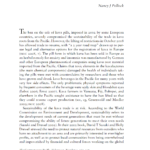Summary of: German Court Ruling Reverses Kava Ban; German Regulatory Authority Appeals Decision. Dr. Mathias Schmidt. 2014

Citation: Schmidt, Mathias. 2014. “German Court Ruling Reverses Kava Ban; German Regulatory Authority Appeals Decision – American Botanical Council.” Herbalgram 103 (Aug-October): 39–44. https://www.herbalgram.org/resources/herbalgram/issues/103/table-of-contents/hg103-feat-germankava/.
Fast Summary:
This document details the legal proceedings and arguments that led to the reversal of the kava ban in Germany. It highlights the complexities of the case and the implications for herbal medicine regulation.
Full Summary:
Background
Kava, a traditional herbal remedy, had been associated with hepatotoxicity (liver damage), leading to a ban on these products by the German government in 2002. This ban had a profound impact on the market and perception of the plant overall, sparking controversy and opposition from several pharmaceutical companies and experts in the field.
Court Case
More than a decade after the ban, seven companies, covering 14 individual marketing authorizations, actively pursued the case against the German Federal Institute for Drugs and Medical Devices (BfArM). The case was finally heard in the administrative court of Cologne, marking a significant step in the legal battle.
Arguments of the Marketing Authorization Holders:
- Efficacy: The companies argued that their preparation is effective against stress-related anxiety and has been scientifically accepted for this indication. They emphasized the therapeutic benefits and traditional use of kava.
- Risk Assessment: They contended that the number of hepatotoxicity cases showing causality by kava was minimal and did not justify a sweeping ban. They challenged the government’s assessment of the risks associated with kava consumption.
- Therapeutic Alternatives: They pointed out that the therapeutic alternatives proposed by BfArM, such as benzodiazepines, were not safer remedies. They argued that the risk for patients would be increased by renouncing kava use, as the alternatives might have more severe side effects.
Court Ruling
The court’s decision on June 10, 2014, was a landmark ruling that fully endorsed the arguments of the kava marketing authorization holders:
- Doubts Regarding Efficacy: The court stressed that mere doubts regarding efficacy could not justify a withdrawal of marketing authorizations. This set a precedent for evidence-based decision-making in regulatory matters.
- Risk Assessment: The court criticized the presentation of the risk of kava as a mere collection of assumptions and hypotheses. The risk of liver toxicity was even considered minor, rated as “rare” or “very rare,” challenging the government’s stance.
- Therapeutic Alternatives: The court rejected the proposal of benzodiazepines and other chemically defined pharmaceutical medications as therapeutic alternatives to kava, acknowledging an increase in individual risk for the patient.
The ruling reset the regulatory situation to 2002, prior to the ban, with the reintroduction of warning labels, regular measuring of liver function tests, and kava being considered a prescription medication.
Update and Appeal
On June 30, 2014, BfArM appealed the court’s ruling, extending the justification for their appeal to September 15. The kava debate may continue for many more years, but the ruling is seen as a major breakthrough, strengthening the legal certainty and predictability of authoritative decisions for herbal medicinal product manufacturers.
Conclusion
The German court ruling reversing the kava ban is a significant legal development in the field of herbal medicine. It highlights the complexities of risk assessment, efficacy evaluation, and regulatory decisions related to herbal products. The ruling also sets a precedent for considering therapeutic alternatives and the broader context of patient risk in regulatory decisions, reflecting a more nuanced approach to herbal medicine regulation.
Notes:
This document encapsulates the complexity of the legal, scientific, and regulatory aspects of the kava case in Germany. It underscores its significance in the broader context of herbal medicine regulation, contributing to ongoing discussions and debates in the field. The case serves as a reminder of the importance of evidence-based decision-making and the need for a balanced approach to regulation that considers both safety and therapeutic value.




